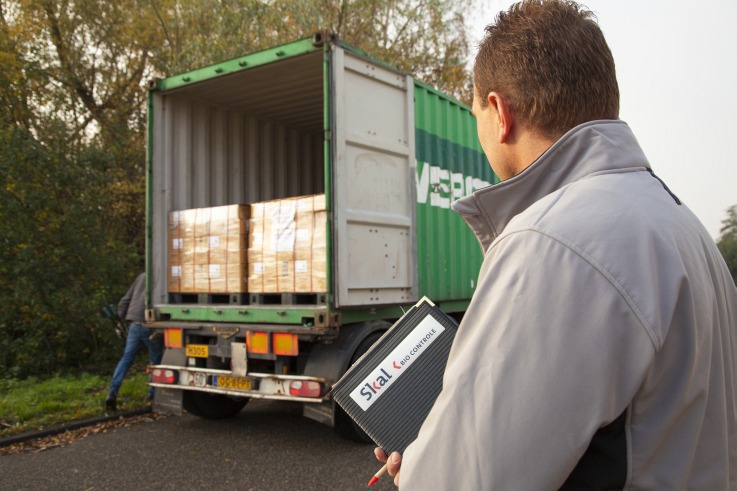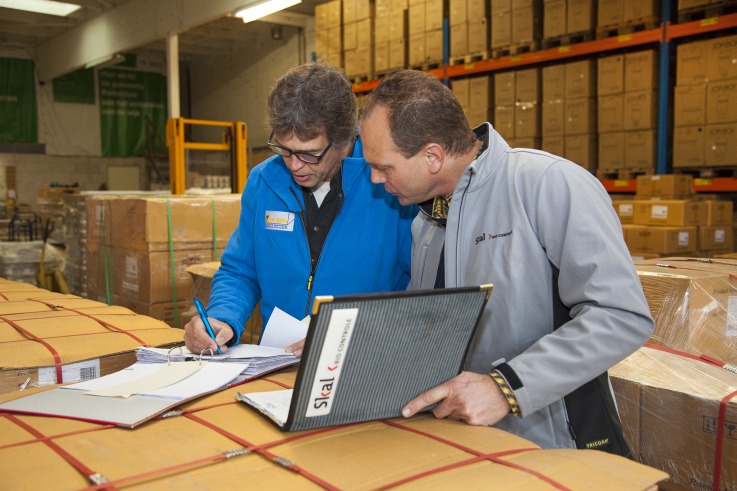Antoon Huntelerslag, Regulation and Control Specialist at Skal:
“The importer must have the Certificate of Inspection in their possession at the time a delivery leaves”
Skal is supervisor of the organic chain in the Netherlands. The Certificate of Inspection is a leading document. But Skal is also responsible for the trade in organic products between the Netherlands and countries outside the EU. Especially during import, operators sometimes get into trouble, notes Antoon Huntelerslag, Supervision Specialist. “If companies do not comply with the regulations, this has enormous consequences, because then the delivery loses its organic status.”
The European organic label has a high standard. When exporting to countries outside the European Union, Skal certificates of inspection are therefore usually sufficient. “The products must of course comply with the European organic laws and regulations. In that way does not become a drain on non-compliant products,” Antoon says.
However, some countries, such as America and Korea, require an additional accompanying export certificate, or ‘Transaction Certificate’. For example, America has antibiotic-free as an additional requirement.
Brexit
As the UK is no longer part of the European Union, Skal will be issuing export certificates for Great Britain from juli 2022. “Exporters will then have to apply for a certificate of inspection. The same as we ask for it for imports from outside the EU.” With that certificate of inspection, simply referred to as COI, importers unfortunately sometimes go wrong.
“The COI is very important; it accompanies the goods from the country of departure to the premises of the first consignee. The importer really needs to have it in his possession at the time of departure.”

Does the Certificat of Inspection accompagny the shipment?
Certificate of Inspection
Skal cannot and must not subsequently approve Certificate Of Inspection’s whose import procedure did not go well. Even if it was accidental. “We really have to abide by the laws and regulations imposed by Brussels. We have no policy freedom. I recently received a question from an operator who imports shipments from a subsidiary abroad. He controls the whole chain himself. Yet he has to apply for a COI for every shipment. Which costs money, of course. Such a company is looking for policy freedom, but we really don’t have that.”
How long it takes to apply for a COI differs per issuing authority. “As an importer you have to find out about this in advance. I usually refer companies back to their suppliers. As they are certified by an inspection body. That controlling body is also responsible for issuing the COI.”
Correct import declaration
Not only is timely application for a COI crucial, it is also very important to file a correct import declaration with customs. “The document code C644 must always be stated on the declaration, in combination with the unique serial number of the COI. This way, customs knows that the products are organic. If the certificate is not signed off, the organic products are not placed under our supervision in time, then the chain is interrupted and the product may no longer be sold as organic. After all, the chain control is the added value of the organic control system.”
Furthermore, for specific countries for high-risk products there are also mandatory checks upon entry. These are the so-called guideline countries: Ukraine, Kazakhstan, Moldova, Turkey, Russia, China and specific shipments from India. These guidelines were drawn up on the basis of the European Commission’s risk analysis, which is fed by residue issues throughout Europe.
Guidelines
Specific goods from the guideline countries are sampled by Skal and extra analysed for pesticide residues. Also a traceability investigation takes place. This traceability goes back to the farmer’s field and must be fully transparent. “If a batch cannot be traced back to its origin, it loses its organic status.”
“For example there was recently an importer who had sent three different shipments with the same boat. That is possible, but then you have to keep each shipment well separated. Which he had not done. Then the traceability is lost and your product is no longer considered organic. That has enormous consequences, but not everybody realises that. In this case, no residue was found, but the correct COI and full traceability are also part of organic status.

Regulary checks by the control body of SKAL
Preventing problems
Companies must make sure they know the regulations. “Make sure the instructions for declaration in free circulation are well arranged. Also contractually with the possible service provider who takes care of the declaration.
An incorrect declaration leads to unnecessary loss of the biological status. That is a shame and it costs money to remove the organic designation. It also helps if importers know their chain: where do the goods come from, is it traceable. “Generally speaking, the shorter the chain, the clearer it is.”
Supervision
The laws and regulations and the supervision and enforcement by Skal on imports ensure that consignments in which unexplained levels of residues are found are removed from the (organic) market. Also consignments of which the origin is not clear, may not be marketed as organic. Above all the Certificate of Inspection should make this clear.
“Operators incur additional costs due to extra controls before they can market a specific product. Unfortunately, this is necessary in order to guarantee that the imported products actually comply with the organic rules. In conclusion inspection contributes to consumer confidence in organic products.”
Source: Skal Biocontrole

